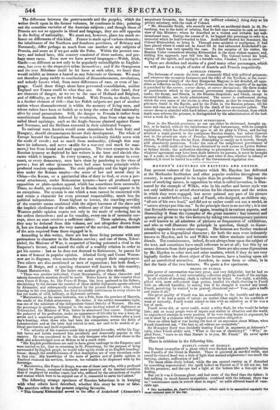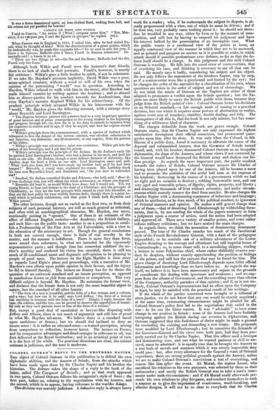HATDON'S LECTURES ON PAINTING AND DESIGN.
rITE present volume of the Lectures which Mr. Haydon has delivered at the Mechanics Institution and other popular societies throughout the country, is more general in its topics than its predecessor. The import- ance of studying nature, in opposition'to what is called invention, is illus- trated by the example of Wilkie, who in his earlier and better style was not 'only indebted to actual observation for his characters and the action in which they. were engaged,: but never painted any part of bis pictnre without a model before bins; and of Fuzeli, who designed, as children say, "all out of his own head," and did not or rather could not use a model, as "nature always put him out." In the principle there is no novelty ; it is one that Reynolds recurs to again and again, treating it in various aspects, and illustrating it from the examples of the great masters : but interest and aptness are given to the two lectures by taking two contemporary painters so well known to all admirers of pictures or frequenters of exhibitions, and who so well illustrate the principle in question, though so diame- trically opposite in every other respect. The lectures are further rendered attractive by a biographical character ; for both the men were intimately known to Haydon, and he and Wilkie were fellow students and intimate friends. The reminiscences, indeed, do not always bear upon the subject of the text, and sometimes have small reference to art at all; but this b no means detracts from their popular interest. There are also some digressions by Mr. Haydon to other men and other matters, which if they do not very logically further the direct object of the lectures, have a bearing upon art and an anecdotical attraction. Anecdote, in some form or other, is in fact. the basis of the two lectures. We quote a few specimens.
mums OF FUZELL His power of conversation was very great, and very delightful; but he had no vigour of argument. A very entertaining collection might be made of his sayings. In all schools of drawing, chalk is rubbed out by bread. One night, a student, gifted with more self-conceit than genius, handed his chalk-drawing to Fuzeli with an affected humility, by asking him if he thought it wanted any bread. Fuzeli, perceiving he wanted to be praised, thundered out—" Yeas, gate a loaffe and youse it all." One great quality of Fuzeli was his accessibility to the humble and the poor student if he had a spark of talent: no matter what might be his condition ot want or necessity, Fuzeli would attend to him with an attention as if he was a boy of rank.
Fusel never did, or never could, resist a witty flash, let who would be before him; and as i
many .people were of repute and station in situation and the world, he engendered enemies n every position. If he were being beaten in argument, he cut it short by a rudeness which stopped conversation altogether.
Once an editor had or was having the best of an argument about Milton, when Eliza thundered out, "The fact is, all editors are scoundrels."
Sir Hompliry Davy was decidedly beating Fuzeli in argument at Johnson's * table, when Fuzeli archly said, " What is the use of chemistry?" "Why," re- plied Davy, "more to me than Nature is to you, Mr. Knell.' He acre? spoke another word.
There is criticism in the following bits.
Puznit's GHOST OF HAMLET. The finest coreeption of a ghost which ever flashed on a painter's imagination was FuzeIrs of the Ghost in Hamlet. There it quivered in maitial stride, and round its vizored head was a halo of light that seemed sulphureous! one smelt the burning, cindery, suffocation of hell ! The moon shone dimly behind, while the sea seemed roaring as if disturbed by something supernatural: the spirit looked on Hamlet as if it did not see, but felt his presence; and the eye had a light at the bottom like a lion-eye at his feeding. But yet it v-as a German ghost, and had more of the fiend than the father; It had nothing to touch human sympathies: combined with the infernal, there was no "countenance more in sorrow than in anger," no sable silvered beard of Vene- rable age.
e The bookseller, St. Paul's Churchyard; where used to be assembled regularly tin most eminent men or the day. It was a fierce demoniacal spirit, an iron-clothed fiend, reeking from hell, and his crimes not yet purified for -heaven!
CANOVA ON WEST AND FITZELI.
I said to Canova, "Au moles il [West] compose asses bien." "Non, Mon- sieur, il ne c/npose pas. ii met des figures en iroupes," he replied. 1815.
When Canova was in England in 1815, I asked him, after he had visited Fu- sel', what he thought of him? With the discrimination of a great genius, which he undoubtedly was, he made this exquisite hit—" Ye ne sono in arte due cose, ii flux° e Is fiamma; Raffaello ebbe il fuoco, Fuzeli la fiamma solamente." In. mortally said! a lesson to us all.
"There are two things in art—the fire and the flame; Raffaelle had the fire, Fuzeli only the flame."
Although both Wilkie and Fuzeli were the lecturer's dear friends, there is no lack of shade in their portraits. Pozen's, however, is merely fair criticism : Wilkie's goes a little further in spirit, if not in substance. If we take Mr. Haydon's accounts implicitly, David Wilkie was a poor, mean-spirited creature, without a word or will of his own when the opinion of the patronizing "world" was in question. According to Haydon, Wilkie refused to walk with him in the street, after Haydon had made himself enemies by writing against the Academy ; and so abused him at dinner-parties for his conduct towards the Academicians, that even Haydon's enemies despised Wilkie for his subserviency. Of the prudent principle which actuated Wilkie in his intercourse with his "world," Mr. Haydon gives the following account, with a strange story about Reynolds and Lord Barrington.
"The disputes between patrons and painters lead to a very important question of great interest and of great consequence to the young student in his beginning and progress through life, viz, how far it is his duty to submit to injustice from his superiors in station and in age, if they be unjust, and how far caprice should be opposed.
" ilkie's principle from the commencement, with a species of instinct which whispered to him the danger of the reverse conduct, was absolute submission to any injustice, any dishonour, any ill-treatment, or any caprice, from his patrons or his elders.
" Wilkie's principle was submission; mine was resistance. Wilkie got into the palace of his Sovereign, and I got into his prison. Wilkie's principle was the principle of Sir Joshua. In Sir Joshua's early life he painted Lord Barrington's brother, who had a disease in his neck, and held his head on one side. Sir Joshua, though a most delicate flatterer of deformity, like Apelles, kept his head a little on one aide. Lord Barrington came and said, What have you done, Sir? you have made my brother look as if he had been hanged!' Reynolds, a young man, explained the reason. His Lordship shook• his cane over Reynolds's head, and thundered out, Do you dare to contradict ma ? '
"Insulted, Sir Joshua consulted Burke and Johnson. who both said, Bear it: if you challenge him you will offend the whole aristocracy, on whom you depend.' "Reynolds .did bear it; so would,Wilkie have done: but I would not. Yet, my young friends, to bear and forbear is the duty of a Christian; and the precepts of Christianity, as they are the best precepts with regard to your fate hereafter, so they are the best policy for your worldly fortune here; though there is a point be- yond which is unmanly submission, and that point I think both Reynolds and Wilkie passed." The other lectures, though not so varied as the first two, or from their subjects of such personal interest, are still as much general as artistical, and often with an autobiographical character, Mr. Haydon, suo more, continually putting in " egomet." One of them is an estimate of the effect of different English societies—the Academy, the British Gallery, and such like—on the public taste : another is on a proposition to estab- lish a Professorship of the Fine Arts at the Universities, with a view to the education of the aristocracy in art. Though the general conclusions in both are correct enough, there is little of real novelty in the matter, and the manner is indifferent. There is more fury than force, more sound than substance, in what are intended for the vigorously argumentative parts ; and though time has somewhat subdued the au- thor's acerbity and rendered his vision less onesided, there is still too much of ill-conditioned taunt and dogmatic self-opinion to be pleasing to people of good taste. The lecture on the Elgin Marbles is their story as regards Lord Elgin's plans and proceedings, with a narrative of Mr. Haydon's own efforts upon public opinion in their favour, and the injury he did to himself thereby. The lecture on Beauty has for its theme the question of an universal standard and an innate perception, as opposed to conclusions drawn or felt from association or comparison. This very difficult subject is beyond Mr. Haydon. He maintains the former view, and declares that the female form is not only the most beautiful object in nature, but the standard of all other beauty. "'The form of a tree is beautiful, and the form of a fine woman, and a column, and a vase; but how can it be said,' says Lord Jeffrey, the form of a woman has anything in common with the form of a tree?' Simply, I reply, because the vase, the column, and the tree, can be proved to deserve the appellation of beauti- ful only as they each partake more or less of the form of a woman."
But, except a good deal of casuistical or lawyer-like disputing with Jeffrey and Allison there is not much of argument and still less of proof in what Mr. Haydon advances. We believe there is a standard based upon usefulness or fitness ; but we should feel inclined to deny an innate sense : it is rather an educated sense—a trained perception, arising from comparison or reflection, however latent.• The lecture on Fresco, and its comparative advantages and disadvantages in reference to oil, was first delivered at the Royal Institution ; and in an artistie,al point of view it is the best of the whole. The practical directions are clear, the critical estimate is judicious, and the tone is moderate.



















































 Previous page
Previous page